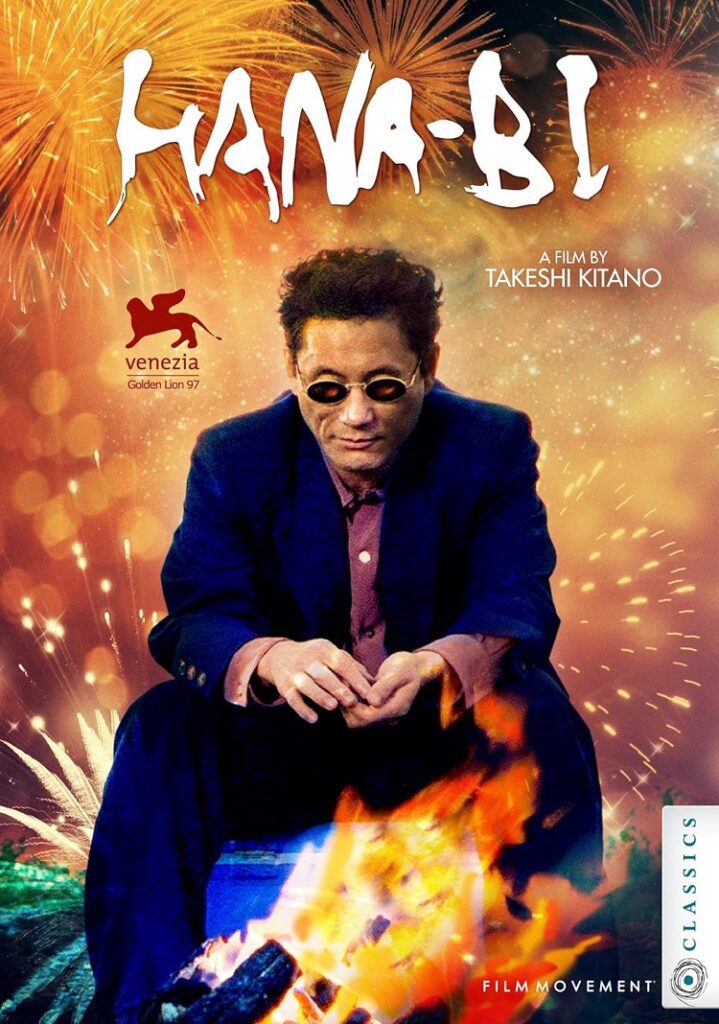
Off-beat and enigmatic, with a timeline that eschews strict linearity, Hana-bi (originally released in 1997 in the states as Fireworks) is a “cop movie” only insofar as the main characters are police officers, and there is violence between them and gangsters. The film’s main focus (without ever getting weepy or talky) is the response to grief and trauma – a response that includes robbing banks and shoving chopsticks into people’s eyes.
Written, directed and edited by as well as starring Takeshi Kitano, Hana-bi follows detective Nishi, a man on the edge. His wife is sick, and his daughter has recently died. He was absent from a stakeout that turned into an ambush in which his partner Horibe was shot and paralyzed. At some point he quits the police and comes to owe the yakuza a lot of money, and ultimately he robs a bank. All of these plot points could be connected into a story of revenge or a violent tragedy, but Kitano doesn’t tell the story in so straightforward a fashion. The scenes aren’t necessarily in order and don’t always carry enough information for the audience to more than infer what is going on.
While it sounds like this type of storytelling could just be an exercise in audience frustration, Hana-bi remains engaging because Kitano’s film style is unique, surprising and rewards attention. His pace is continually changing up – some scenes contain long, mostly silent shots of characters, then actions and sound so quick it takes your mind a second to put them together, while the scene is already in its aftermath. Violence is often just off-camera (except when it explosively is not) and there’s always room, even in between serious scenes, for a joke.
Hana-bi tells the parallel stories of Nishi and Horibe. Both become ex-cops with broken families: Nishi because his wife is dying and child dead, Horibe because his wife and daughter leave rather than live with him crippled. Nishi turns to crime and violence, while Horibe (after an unsuccessful suicide attempt) takes up painting. These paintings, which regularly punctuate the latter parts of the movie, are largely animal portraits but with flowers in place of their heads, and all were actually painted by Kitano.
Kitano’s performance as Nishi could probably be best described as minimalistic. There are several scenes where he does not say anything, and barely moves except for a slight change of expression. There’s a sense that he is tightly coiled, and becoming more and more so, though it’s still shocking when he eventually strikes. There’s never fury or lack of control in his actions, just determination. His expression only melts when he’s in the presence of his wife. Nishi’s wife is nearly silent, and though she is both dying and distraught over the loss of the couple’s daughter Kayoko Kishimoto portrays her with a real sense of warmth despite her trauma. Their scenes together, which are little islands of domesticity punctuating Nishi’s increasingly criminal life, have very few words, and paint a portrait of a tight, loving unit, which if circumstances in life brought them down they’d go down together.
Hana-bi, and several of his other 1990s works that made it state-side like Violent Cop and Sonatine define a persona for Kitano, of the tough take all customers roughneck, which interestingly is completely at odds with the persona he had in Japan. He got his start there as a comedian, and eventually dabbled in all mediums, especially TV, and it was quite some time before Japanese audiences would take his film work seriously. And Hana-bi is a film worth taking seriously, which doesn’t mean it’s necessarily grim or dark. It combines many of the elements of cop and yakuza movies, but injects a sort of filmic poetry and beauty that’s rare in any genre.
Hana-bi has been released on Blu-ray and DVD by Film Movement. It includes a full-length commentary by critic David Fear and liner notes with an essay by Jasper Sharp, both of which contain excellent background on Kitano’s career, and this film specifically. There’s also a fun 30 minute vintage making of featurette consisting mostly of behind the scenes footage of Kitano acting and directing.